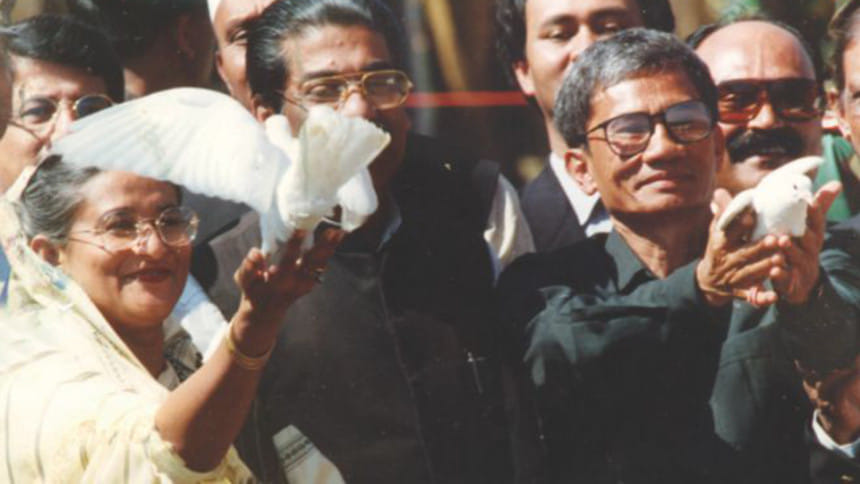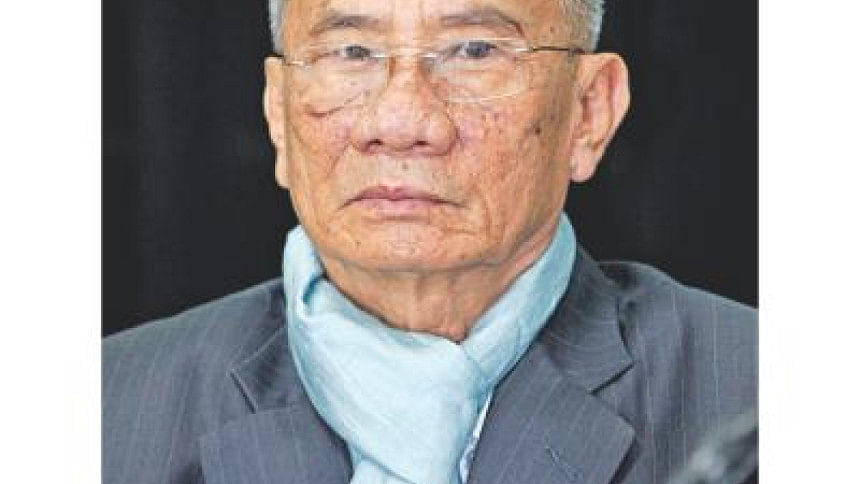CHT Peace Accord: Only 26 of 72 clauses implemented

The hill people had to struggle and make sacrifices for achieving the Chittagong Hill Tracts Peace Accord. Every single family there was affected in one way or the other. Since its signing, 19 years have gone by but the hill people are yet to see its full implementation.
This is not expected at all, Parbatya Chattagram Jana Sanghaty Samity (PCJSS) President Jyotirindra Bodhipriya Larma, popularly known as Santu Larma, said in an interview with The Daily Star on the eve of the 19th anniversary of signing of the accord in 1997.

It has not been implemented for lack of interest of the government, he said.
If the government doesn't implement the accord immediately, it would have to take the responsibility for any “untoward situation” in the CHT region, he said.
Asked what he meant by “untoward situation”, Santu Larma said, "It could be anything.” It is something we don't expect to happen. “We don't want to call hartal to demand implementation of this accord unless the government compels us to do that."
The situation in the CHT hasn't got better. The living standards of the indigenous people have not improved. Forces outside the civil administration still control everything in the CHT, he said.
Though the government says 48 of the 72 clauses in the accord were already implemented, Santu Larma claimed that only 26 clauses have been implemented so far.
"It is not just a mere claim. We have published reports, mentioning which clauses of the accord were implemented and which were not. The entire world knows that."
Some of the clauses of the accord were implemented and laws were passed or amended in accordance with that. But the government has not made any rules for those laws, meaning that those cannot be brought into force, he said.
Besides, many laws need to be amended in line with the CHT accord, he mentioned.
"The present government is so powerful. It can change the constitution if it wants. Making and amending necessary laws in accordance with the accord is not a big deal for this government."
On the CHT Peace Accord Implementation and Monitoring Committee formed by the government, Santu Larma said the committee is not functional at all. It has no office, no fund, no staff and no work.
"If this committee [headed by Deputy Leader of Parliament Syeda Sajeda Chowdhury] is made functional, it could give a transparent report on the accord's implementation. This would help expedite the implementation process."
Asked about the major problem in the CHT at this moment, he said if the land issue is settled, many problems in the hill region would be resolved. But even then there would be other issues to address.
He said some major issues yet to be settled in line with the accord are withdrawal of temporary military camps, relocation of Bangla-speaking people and their proper rehabilitation outside the CHT, formation of local police force, and amendments to the 1861 Police Act and the Forest Act 1927.
Expressing his frustration, Santu Larma said the indigenous people are becoming outnumbered day by day in the CHT region, as they wait for the implementation of the peace accord.
The government had brought around five lakh Bangla-speaking people to the CHT and got them settled there. Now their number has risen to around seven lakh, he said.
In 13 of the 26 upazilas in the CHT, the Bangla-speaking people are now in the majority. But their number was very low in the 70s when the process of bringing settlers began, he noted.
These Bangla-speaking people are poor. Most of them don't have any livelihood, and they survive on ration provided by the government. These people deserve proper rehabilitation outside the CHT in line with the peace accord, noted Santu Larma, former guerrilla leader who once fought for “regional autonomy” of the CHT.
He became chairman of the CHT regional council formed after the signing of the peace accord on December 2, 1997.
He said the government was supposed to have discussions with the regional council before making any decision on issues regarding the CHT.
"But I was in the dark when the government created a new upazila named Guimara [in Khagrachhari]. Many things like this are happening."
"In most of the cases, the government doesn't hold discussions with the regional council before making any decision. But it is mandatory as per the peace accord," he added.

 For all latest news, follow The Daily Star's Google News channel.
For all latest news, follow The Daily Star's Google News channel. 



Comments